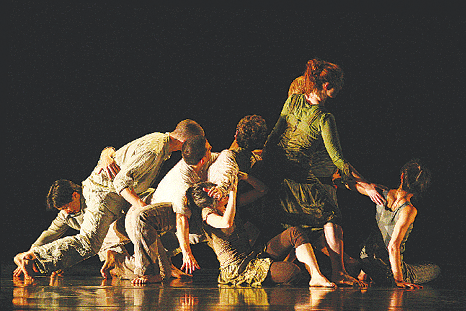A real independent celebrates 20 years of dance making
Doug Varone’s career has not been typical for the artistic director of a single choreographer company in New York; unsupported as an emerging choreographer by the presenting organizations, he’s had to forge his own path. Now, as his company celebrates its 20th anniversary season, Varone is enjoying the fruits of his labor—and independence—more than ever.
It seems like he and his company are everywhere in the city, averaging two major events a season. When they’re not performing in dance venues, they’re moving in operas, film, musicals, even straight plays.
In addition to creating dances for his own troupe, Varone has choreographed for fashion, theater, opera, television, and film. He’s been commissioned by Batsheva, Limón Dance Company, DCDC, and numerous ballet companies. His recent Lincoln Center production of “Orpheus and Euridice” earned him a 2006 OBIE Award. His credits include several new productions for the Metropolitan Opera, including Stravinsky’s “Le Sacre du Printemps (2003), Richard Strauss’s “Salome” (2004) and Tobias Picker’s “An American Tragedy” (2005). He also choreographed and staged the operas for the Minnesota Opera, New York City Opera, and the Washington Opera; and in 2001, he directed and choreographed Opera Colorado’s production of Gluck’s “Orphée at Eurydice” and returned in 2004 to direct Rossini’s “Barber of Seville.” In 2006, he directed and choreographed the American premiere of Laurent Petitgard’s “The Elephant Man” for the Minnesota Opera.
Unlike other commissions that hire a choreographer to work with an existing ensemble, Varone insists on using his own dancers. “The work I create is about movement,” he explained. “I tell them I’m not the right person if they want someone to stage an opera in the traditional sense. Sometimes they say no.”
But very often they say yes, again and again.
As a result of his unorthodox approach to the field, there are new challenges every year.
“Because I do a lot of different things,” said the choreographer, “I have felt lately like I’ve been doing a lot of the same thing.” That’s what prompted the creation of “Boats Leaving,” set to music by Arvo Pärt, which will have it’s New York premiere at the Joyce.
Varone says, it’s a departure for him, “physically in terms of time and process. It’s about departure, about the transience of life; the idea that you will always remain, but people, places, and things will always leave you.”
On the other hand, “Lux,” the world premiere on the program, is what he calls “pure Varone. It’s highly physical, about the current company, and includes some homages to commissioned works—including “Orpheus” and “The Invisible Man.”
The two programs at the Joyce Theater include Varone’s celebrated repertory works, “Castles” (2004) to a Prokofiev score, “Bench Quartet,” which is set to Bach and premiered at PS 122 in 1986, the year of the company’s debut, and the renowned “Possession” (1994), to music by Philip Glass.
“Possession,” which has also been set on students at SUNY Purchase and North Carolina School of the Arts, came out of a period of great creative fertility, said Varone.
“With ‘Rise’ ‘Aperture,’ and ‘Possession’ I found an aspect of my artistry I been searching for. It’s my first work that deals in a non-linear sense; and there’s an implied scenario instead of a specific one. It was a big curve to get past as a creator. People had never seen that kind of work from me.” Former company members that were part of that creation, Gwen Welliver and Larry Hahn, will perform for the 20th anniversary season.
Varone, who turns 50 the days after his season concludes, had a hip replacement in 2005, but he’ll be dancing again at the Joyce. “It’s a triumph,” he says.” “I haven’t been in a group work in a long time.”
“It’s been a slow progressive journey,” says the choreographer, reflecting back on his 20 years of dance making. “And while I felt like I was on my own, I’ve been allowed to grow as an artist.”
“It’s still difficult,” he adds. “Even with a $1 million budget it’s a struggle. I think about opening a school or buying a building—we have no home. Part of that has been on purpose… Now, I’m not sure where our home would be. I don’t feel I need the energy of the city to create work anymore.”
Rest assured, you will still feel the energy of the city in his movement.
gaycitynews.com
































